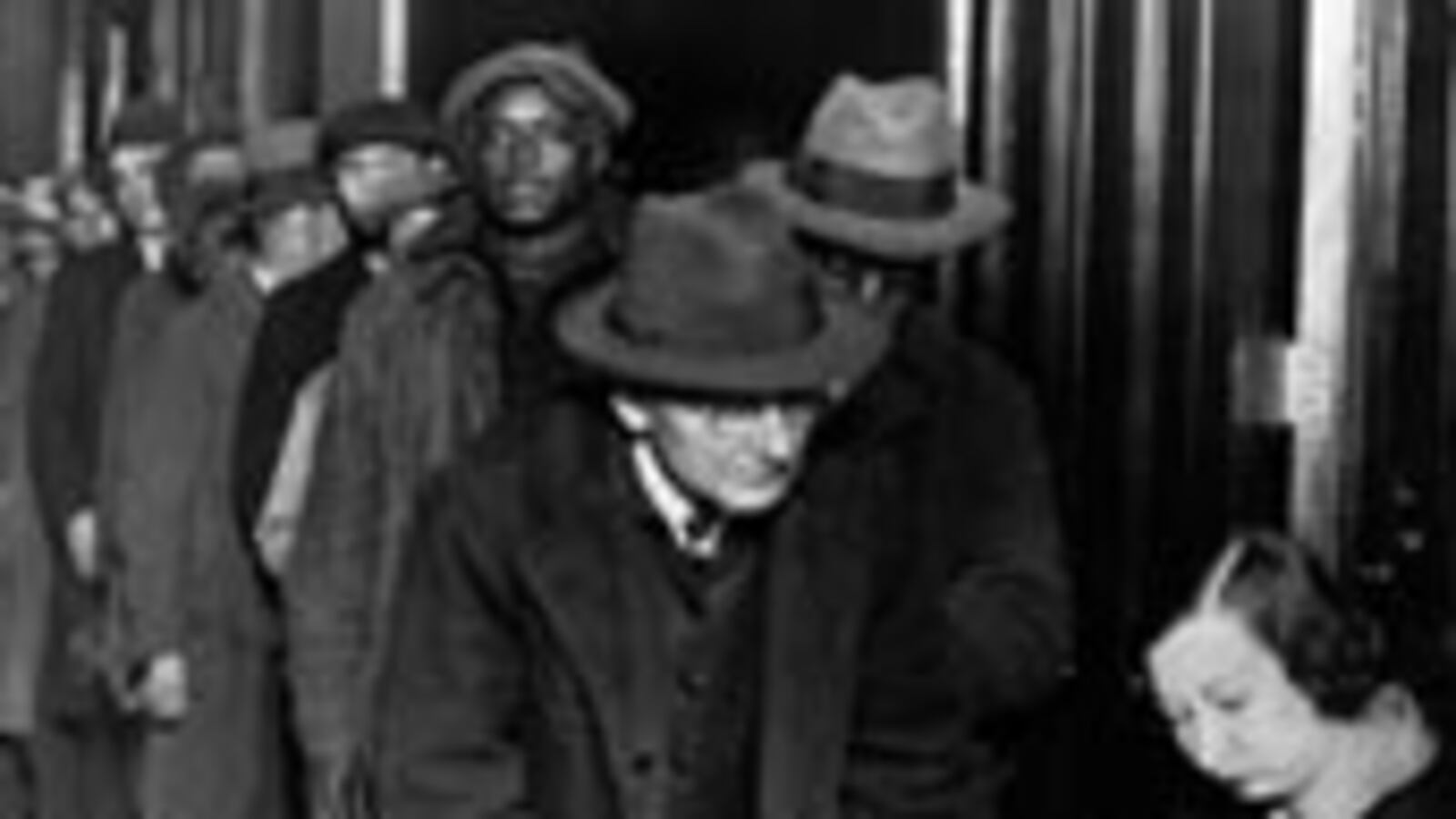
for the year, amid jitters about the global economy. Harold Evans on the lessons of the Great Depression, and why we shouldn’t cling to formal accountancy.
Do you know how to fix a flux capacitor? That’s the device that turned the DeLorean car into a time machine in the 1985 movie Back to the Future. It hurtled Michael J. Fox back 30 years to 1955. To return to his present day, his flux capacitor needed a providential shaft of lightning.
We’re trapped in a time machine now, heading back much further than Michael J. Fox—back to the ‘30s and on course to another Great Depression unless we get a shaft of lightning. That’s not going to come from the G-20 summit of leaders, despite the efforts of the more perceptive President Barack Obama; alas that the distorted shape of Congress’ $787 billion package gave stimulus a bad name.
The deficit hawks are back everywhere, sounding exactly like Herbert Hoover and the budget balancers who helped prolong the Great Depression. The common intuition then, as now with the Tea Partiers, is that unbalanced household budgets invite catastrophe, and so will unbalanced government budgets. Common sense can be wrong. Science is a journey of the unexpected. Those who cling to the homely metaphor of kitchen budgets are like beginners at skiing who find it hard to take the experts advice to lean away from the mountainside and into the void when making a turn to reduce speed. Every instinct screams at the novice to do the opposite, to hug the slope, and every ski slope is littered with the triumph of physics over psychology.
The common intuition then, as now with the Tea Partiers, is that unbalanced household budgets invite catastrophe, and so will unbalanced government budgets. Common sense can be wrong.
If you think the 2007-2010 recession and stubbornly high unemployment are grim, wait till you see the effects of the new austerity wished upon the world by the deficit hawks. Just look at the devastating and irrecoverable loss of wealth Ireland has suffered from 2007 on, outlined by Liz Alderman reporting from Dublin.
Instead of paying unemployment money to the millions out of work here and there, let’s get something for our money: massive retraining, a halfway decent railway system, broadband across the nation, crumbling water and sewage systems restored, an efficient National Grid, airline terminals as good as what we used to call the Third World’s, and so on. Do your own list. Getting America going again doesn’t by any means have to be by direct government employment, with all the bureaucratic obstructions. Much could be achieved by tax cuts, especially for small businesses.
The revenues from making and doing things would flow to government, reducing debt to GDP ratios faster and more to our benefit that the meat axe brigade will achieve.
The deficit hawks—themselves comfortably employed, thank you—dance on what they conceive as the grave of John Maynard Keynes, who tried in the ‘30s to convince FDR that balancing a budget in a depression was a fool’s delusion. They’ve revived the myth that the New Deal was based on Keynesian economics and the New Deal failed to end chronic mass unemployment. Therefore Keynesian remedies did not work. The New Deal did indeed fail to produce anything like full employment, but the one thing the “suck-it-and-see” president did not really try then was full-blown deficit financing. The grudging New Deal deficits ran only around $3 billion. The wartime deficits, the trigger of full employment, averaged more than $40 billion. Roosevelt, the Emperor of Empiricism, never learned the lesson Keynes tried to teach.
He ignored, too, his chairman of the Federal Reserve, Marriner Eccles, a small, peppery Mormon banker from Utah. Eccles had reached the same conclusion as Keynes, but from personal observation of the 1929 crash. He was horrified that Roosevelt was still pursuing the chimera of a balanced budget, promising it for 1938 even though recovery had barely started. Eccles stressed to FDR, “the crucial consideration is not the size of the deficit but the level of national income.” Federal spending should not be cut until private enterprise had expanded enough to take up the slack in employment. A wave of deflation would spell the doom of the Democratic Party, perhaps even pave the way for totalitarianism—a prophecy all too balefully fulfilled with the marching boots of the fascists.
FDR clung to the conventional wisdom. He balanced the budget in 1938, whereupon unemployment shot back from 8 million to more than 10 million.
America was not unique in the ‘30s for clinging to a formal accountancy rather than a dynamic economic policy. Each European country tried with suicidal rectitude to balance its budget, but they came around to adopting Keynesian solutions sooner than the U.S. and were quicker to emerge from the Great Depression. Socialist Sweden, where 1 in 3 had been out of work between 1923 and 1933, was back to full employment by 1939. Germany’s unemployment was down to 2.1 percent in 1938, and Britain’s to 9.3 percent. Meanwhile, American unemployment was back at 19 percent. By 1938, national incomes in Britain and Germany had exceeded those of 1929. It took until 1941 for that to happen in America; economic life was revived by the merchants of death.
In both Germany and Britain, public spending had risen sharply; it was 35 percent of national income in Germany and 23.8 percent in Britain, but only 10.7 percent in the U.S.
America paid a severe penalty for the lack of intellectual curiosity, the erosion of progressivism and the general pressure for conformity of opinion.
Keynes was regarded as a heretic by Herbert Hoover, FDR, and the bankers. He remarked that it would take a generation for his heresy to become the conventional wisdom. He was too sanguine by half.
Obama can’t get the $200 billion jobs package he wants. I’d think the Republicans have a moral duty to help him. After all, theirs was the party that took the Clinton surpluses and turned them into deficits as far as the eye could see. Just as they did with Herbert Hoover.
Harold Evans, author of two histories of America, just published his memoir, My Paper Chase. Editor at large of The Week, he was editor of The Sunday Times from 1967-81 and The Times from 1981-82, founding editor of Condé Nast Traveler, and president of Random House Trade Group from 1990-97.





